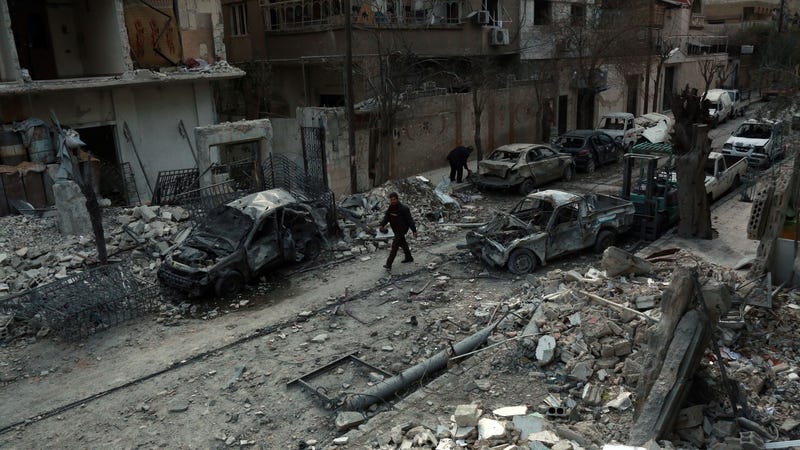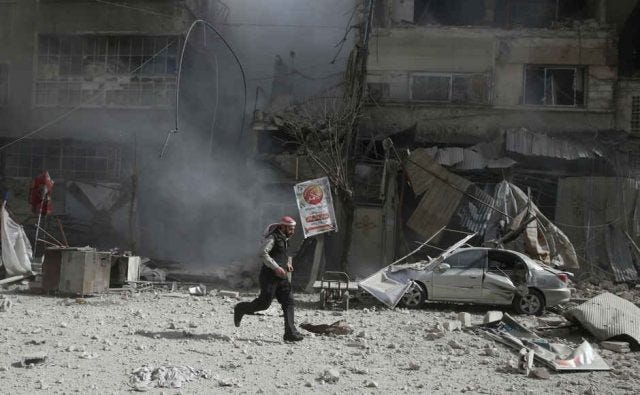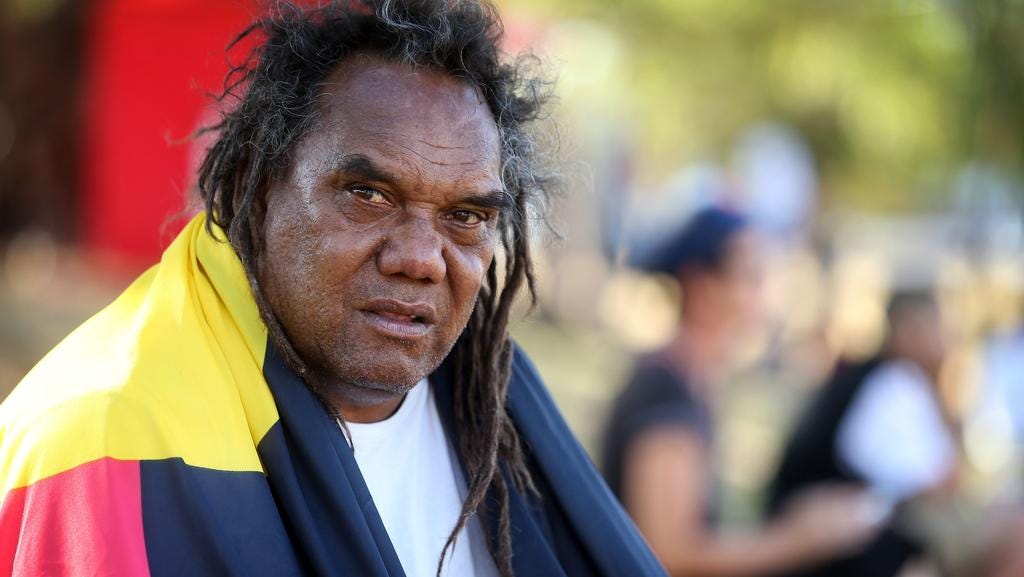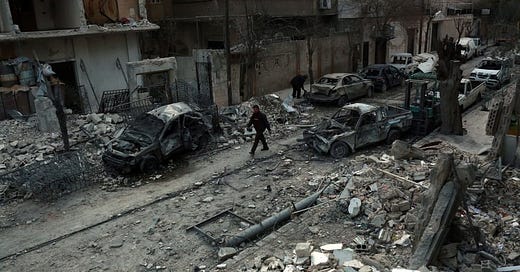
How dangerous is this man?
I went into bat for him the other day.
On the screens, harm on harm. In a world run out of control. In a besieged population.
The German and French leaders have urged Russia to exert "maximum pressure" on Syria for an "immediate" implementation of a UN ceasefire in the war-ravaged country, according to the German government.
German Chancellor Angela Merkel and French President Emmanuel Macron stressed in a telephone call with Russian President Vladimir Putin "that it is crucial that the (UN) resolution be implemented quickly and comprehensively," Ms Merkel's office said in a statement.
The UN Security Council demanded a 30-day truce across Syria yesterday, as one of the deadliest air assaults of the seven-year war pounded the rebel enclave of Eastern Ghouta, outside Damascus.
Nothing could equal the pain of another place. The US led Coalition, of which Australia was the second largest contributor, continued its deadly assaults on chosen enemies.

BEIRUT: Air strikes on the last pocket of Islamic State jihadists in eastern Syria have killed at least 25 civilians, including seven children, a monitor said on Monday.
The strikes were conducted on Sunday on and around the village of Al-Shaafah, north of the former IS bastion of Albu Kamal near the border with Iraq, the Syrian Observatory for Human Rights said.
The head of the Britain-based Observatory, Rami Abdel Rahman, said the air strikes were carried out by the US-led coalition.
“Twenty-five civilians, including seven children, were killed in the village of Al-Shaafah and in surrounding desert areas in coalition strikes all through Sunday,” he said.
“This village is in the last pocket controlled by IS in the east of Syria,” he said of Al-Shaafah, which lies on the eastern bank of the Euphrates River.
In Australia the White Flight was on.
The cities were destroyed. Or handed over to the hordes. The leftwing dreams of a multicultural paradise were dead. The government narrative a lie. In the ruins, trouble stirred.
The Prime Minister Malcolm Turnbull had returned from what many hoped was a valedictory tour to sup at the Trump Table. Another supplicant in the halls of power.
Despite the ready available of the best of everything, he was growing thinner, tenser, his hair disappearing.
"Bill Shorten has been informed."
Was it cancer?
Was it stress?
Based on what? The rumours flew.
Based on a trail of hatred. Based on having treated everyone in his path as minions. Based on having thrown everyone in his way under the bus.
Old Alex heard them in the ether, the plots and counterplots, the old curses that wended their way through other people's lives. Live by the sword, die by the sword. A sea of treachery they call the Capital. Canberra.
Another layer of puss. A new National Party leadership.
The Veterans Affairs Minister.
It was news to everyone that Australia even had a Veterans Affairs Minister known as Michael McCormack, who had clearly been collecting his handsome salary while hiding his light under a bushel.
The rebel MP from North Queensland aligns himself with the same rural conservatives who have long admired the party’s fallen leader Barnaby Joyce, himself once a National Party renegade.
Sworn in as Deputy Prime Minister on Monday, Mr McCormack, 53, will be tasked with speaking directly to those voters – and keeping them out of the arms of One Nation.
“I realise the challenge and responsibility ahead of me,” he said of his new role as leader.
“I will fight. I have never shirked from a tough decision and I will never be silent when I ought to speak.”
The so-called rebel MP was having a little trouble living down his past.
In 1993, two years after Mr McCormack became the youngest editor at an Australian daily newspaper, he wrote a homophobic column in his own paper, Wagga Wagga’s Daily Advertiser.
Published on May 1, 1993, the piece began: “Dear readers, A week never goes by anymore that homosexuals and their sordid behaviour don’t become further entrenched in society.”

Well that's all very liberal of you doll.
Words came easily to this privileged caste.
Ensconced amongst empty holiday houses, nestled out of sight of all but the AIs and the camera swarms, fled through privilege to remote outposts, cast adrift in different sea, Old Alex only had one message.
Pulse.
The storm was on.
THE BIGGER STORY:

The leader of a militant Aboriginal group targeting the Commonwealth Games has warned that young activists could resort to terrorism in pursuit of their goals.Brisbane activist Wayne Wharton said Malcolm Turnbull’s intransigence on indigenous issues from Australia Day to the Uluru Statement was pushing some protesters to consider more radical and, potentially, violent tactics.“Malcolm Turnbull’s statements in the past three weeks are close to inciting (the use of) guns and (Aboriginal activists) taking up terrorism,” he said. “Some of our young people are not far off it with the things he’s said.”
Mr Wharton said he would not promise that protests at the Games on the Gold Coast in April would remain peaceful.
“If a policeman or a white racist comes for me, I am taking justice into my own hands,” he said. “I’m not afraid of jail ... we won’t go near innocent people but there’s no justice in the white system and we need to stand up.”Mr Wharton’s statements leave a spectre of violence over the Games, which are already expecting large-scale protests.

While foreign immigrants continue to descend on Sydney, making it their gap-year playground, lifestyle retreat or refuge from danger, Australian residents would prefer to be elsewhere.
Behind the city’s well-publicised population growth is a little-known fact: Sydney loses more people to the rest of Australia than it gains, and has done so for more than four decades.
In fact, Census data collated exclusively for the Herald shows Sydney has lost people to every Australian capital city and state over the past 45 years on a net basis.
All up Sydney has lost net 716,832 people to the rest of Australia since 1971.
The city keeps growing due to its healthy birth rate and the fact it is a prime destination for foreign immigrants.
But the combination of an international inflow with a domestic outflow has radically shifted the city’s demographics.
In 1976, less than one in four Sydneysiders was foreign born. Forty years later the figure is nearly 40 per cent. Mr McCrindle said he knew Sydney had an image problem when his company conducted a research survey in August 2015 and found residents much more pessimistic than optimistic.
Of more than 1000 Sydneysiders questioned, 64 per cent said Sydney was worse than it was five years ago, and 66 per cent believed it would be worse again in five years’ time.



